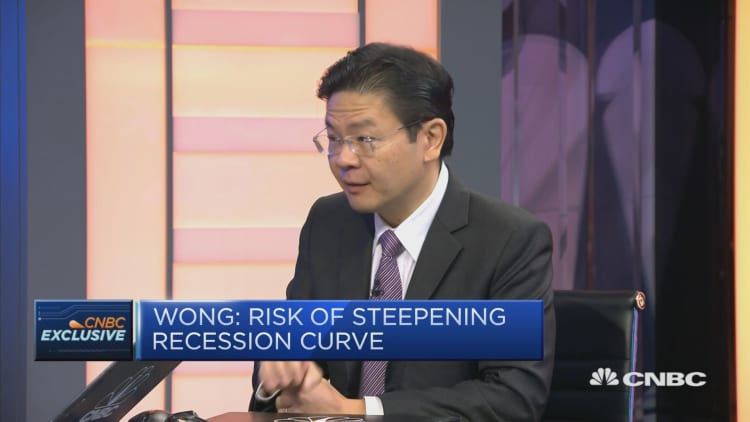
Countries globally are facing "a twin crisis of unprecedented proportion" of a public health threat in the form of a new coronavirus and heightened risk of an economic recession, a Singapore minister said Wednesday.
The number of reported cases of the coronavirus disease, formally named COVID-19, has crossed 180,000 globally, according to the World Health Organization (WHO). Measures taken by authorities to slow the spread of the virus — such as closing borders and keeping people at home — have compounded the outbreak's hit on the economy, with many experts now warning of a recession.
"The challenge is that the more we do to flatten the infection curve, we are actually also steepening the recession curve because as we do more of these measures, the right measures, to save lives ... economic activity will be reduced and it will increase the risk of an economic downturn," Lawrence Wong, Singapore's minister for national development, told CNBC's "Squawk Box Asia."
"So really, we are dealing with a twin crisis of unprecedented proportions: One, a public health emergency; and second, an economic crisis. An economic crisis which will be more severe than ... anything we have ever seen in modern history," said Wong, who's also second minister for finance and co-chair of a multi-ministry task force to fight COVID-19.
Singapore, a Southeast Asian country with a population of around 5.7 million, was one of the earliest outside China to report cases of the new coronavirus. As of Tuesday noon, the country has reported 266 cases, of which 114 have been discharged from hospitals, according to its Ministry of Health.
The country hasn't reported any deaths.
As a trade-dependent economy and a major aviation hub, Singapore is expected to be hit hard by the coronavirus outbreak. Last month, the government downgraded its forecast range for the change in the country's gross domestic product to between -0.5% and 1.5% for this year — worse than earlier projections of growth between 0.5% and 2.5%.
With the virus having spread to more countries over the past month and showing little signs of abating, the Singapore government is preparing a second stimulus package to support its economy, said Wong.
That's in addition to 5.6 billion Singapore dollars ($3.92 billion) worth of measures announced last month to help businesses and households tide over the outbreak.
"We had already in some ways, earlier in the year, anticipated that this would be an economic downturn that would be severe and prolonged," said the minister. He added that's why the government announced a larger stimulus than what it spent during the SARS outbreak in 2003.
SARS refers to the severe acute respiratory syndrome that infected more than 8,000 people globally, with 774 deaths, according to the WHO. During that outbreak, Singapore reported 238 cases and 33 deaths, according to the country's health ministry.
"We're looking at a second package (of stimulus) because we recognize that given what we're facing today, there will be significant impact not just in the near term, but potentially in a prolonged fashion," said Wong, noting that several medical experts have warned that the coronavirus outbreak could last about a year.


